Representing Iceland at the Embassy (Part 1 of 2)
Wed, Mar 29, 2017-
Tags
“If the chance comes along, absolutely go for it”
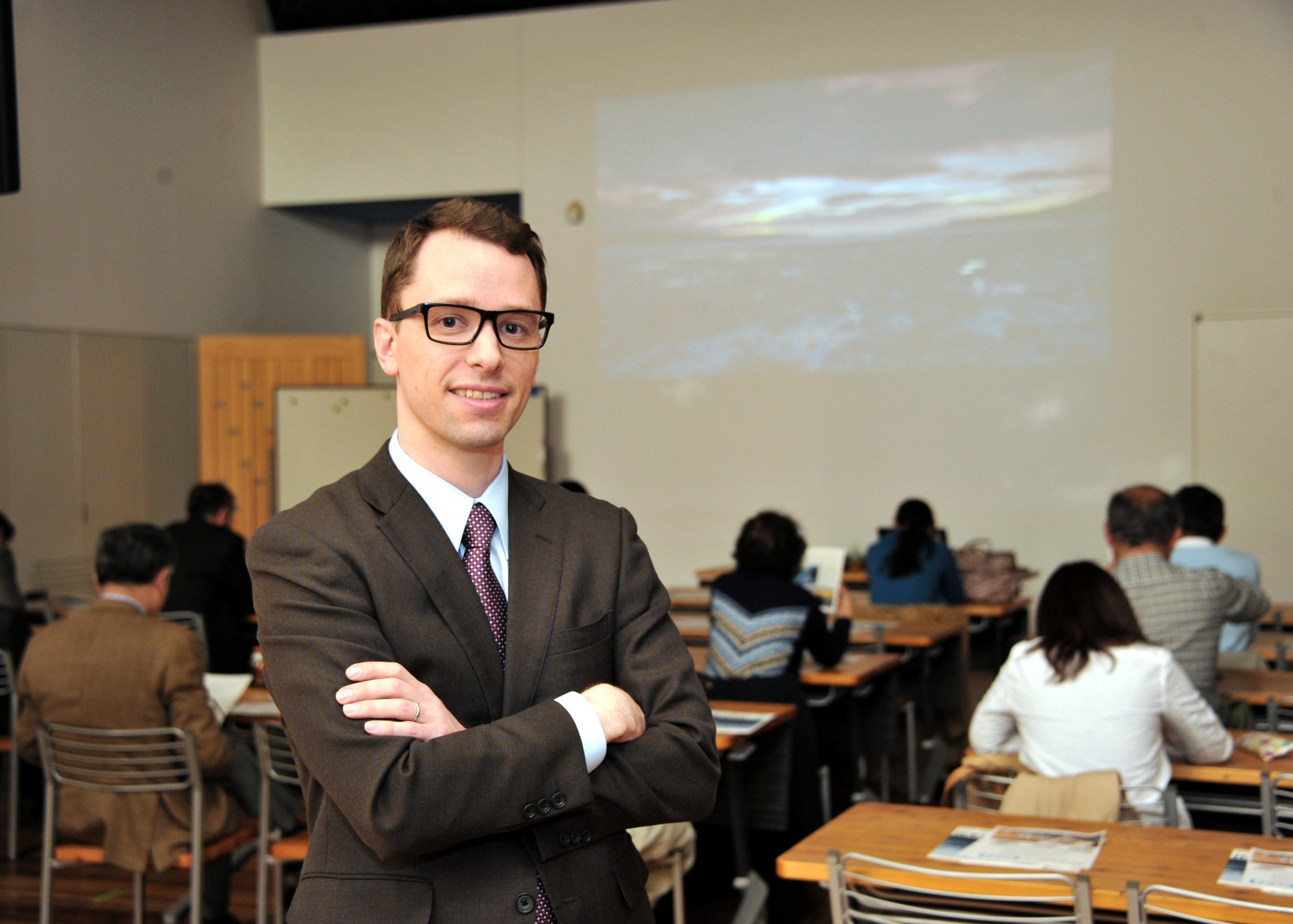
Halldór Elís Ólafsson, Trade Representative of Iceland embassy, at Eco plaza, Hamamatsucho on March 27, 2015. CM Fujii. YOSHIAKI MIURA PHOTO
Hailing from Iceland, a country where pure nature are right at your fingertips, Halldór Elís Ólafsson, a 2010 GSAPS* graduate, is currently the Deputy Management Officer for the Embassy of Iceland and Secretary General of the Icelandic Chamber of Commerce in Japan. In Part 1, He shares his experience studying at Waseda and living in Japan.
The futuristic Tokyo
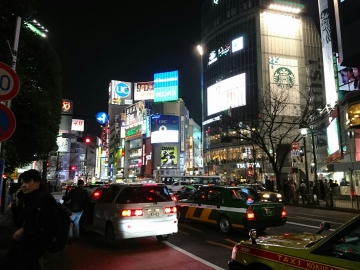
“Futuristic” Tokyo
“My father, who visited Japan when I was around 3 or 4 years old, brought back some souvenirs such as a yukata and toys. That’s the first memory I have of here, and growing up, I always had the feeling that Japan was futuristic with its neon lights, super high-speed trains and robots,” explains Halldór on his reasons for coming to Japan. “Especially, the image of Tokyo in the 80s and 90s when Japan was absolutely booming and was considered the world’s powerhouse stuck with me. This was an absolute contrast to Iceland, where it only takes you 5 minutes to get out of the capital, Reykjavík.”
His mother had known about his interests in Japan and pointed out to a news bulletin in the local newspaper looking for MEXT Scholarship applicants. Halldór then went to the Japanese Embassy and gathered information on programs taught in English, eventually narrowing his list down. “Because of where my head was at that time, Waseda’s program fit the profile of what I wanted to follow. It was kind of 当り前 (atarimae, meaning ‘obvious’) to apply here.” He was accepted to the Graduate School of Asia-Pacific Studies (GSAPS) Master’s degree program, and studied international relations and environmental sustainable development. “Under the guidance of Professor Shunji Matsuoka, I specialized in energy policies and environmental economics. The energy industry was an area I was very keen on working in some fashion, not necessarily in a business sense but more towards public service and policy making. Environmental sustainable development and Iceland go very hand in hand since renewable energy, geothermal energy and sustainability policies are a big part of the country, as well as here in Japan.”
“Globally universal” Waseda and life in Japan
Globally universal is how Halldór describes his Waseda experience. “I had very many things in common with my classmates from China, South America and America. This follows the age of globalization, when a country background tells less about someone. It was very easy getting along with people who shared similar visions on what the world should be like, which was pleasantly surprising. Though most of my fellow classmates have left Japan, it’s great to see that those who have stayed are pursuing public service related to their studies.”
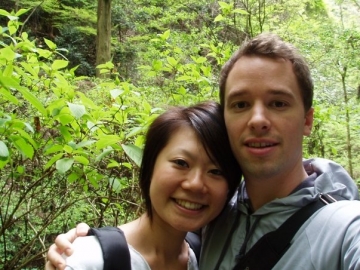
Halldór with his wife, whom he met at Waseda
Halldór says he found adapting to Japan to be very easy. “My general history with this country has been very positive. I remember the first day when I came to downtown Tokyo from Narita Airport by bus. There were three, four layers of highways. This made me feel a little overwhelmed, that everything was so concrete and layered, but at the same time, very satisfied to see that it was exactly how I had imagined Japan to be like. Getting your head straight could take a few days, even weeks, but living in here has never been difficult because everything is very easy and comfortable. You could make the experience unnerving and hard on yourself if you decide to disconnect from all the international communities. I suppose you learn most that way, but I decided to do that in steps. Reality in Japan is never forced upon you, so you can decide to lock yourself away to live your own life and have a passive relationship with Japan. Yet, once your curiosity kicks in and you start engaging with Japanese people more, you become more immersed in the society. That’s when Japan really comes to life. I have been very fortunate to have good people around me, like friends I made in school and at work. I met my wife in school, and worked here and there. Looking back, I could see how things could have ended up differently, but it worked out very well for me.”
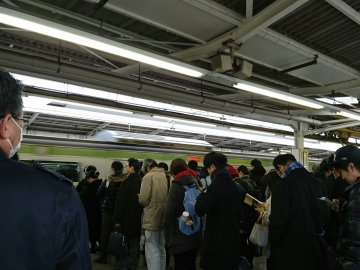
Commuters waiting for the train
As an example of how he adapted his lifestyle, Halldór talks about the commutes. “When I tell my friends that it takes me an hour to get to work and come back, they find that unbelievable. Commuting time in Japan is very long, so it changes the way you run your family. You have to schedule things more and you get X many hours of sleep. This is an alien concept for Icelandic people who usually work from eight to four and spend the rest of their day with their family or for leisure. In addition, most Icelandic people commute to work by car to a workplace less than 15 minutes away, whereas cars are unnecessary in Tokyo. After all these years, I am very happy with my commuting time. You learn from the Japanese to use your time wisely. There are people studying English, reading the newspaper or playing video games. Perhaps you may simply think that you are only on the train for a couple of minutes, but when you put all these minutes together, you start wanting to use it for something productive. I usually read books or catch up on emails, trying to be as efficient as I can.”
“I am also probably healthier here because you walk so much. Icelandic and Japanese people have some of the highest longevity in the world, but people are asking about why Japanese people are so slim and healthy all the time. Though Icelandic people also bathe in hot springs and eat a lot of fish, what sets us apart is the walking. I’m sure this has something to do with the Japanese being very healthy. Doctors say that you should walk 10,000 steps per day, which is pretty achievable in Japan. In Iceland, you would really have to make the effort. I’m glad that this is part of my daily life, keeping me healthy without even trying.”
To be a Waseda graduate
Halldór believes that being a Waseda graduate has helped him communicate with Japanese and foreigners in Japan. “When people ask me why I came to Japan, saying that I came here to do my Master’s degree at Waseda is a fantastic ice breaker for any conversation. It’s not only reputable in Japan, but Waseda is well-established in Asia. For what I am doing here at the Embassy, which is basically assisting with trade promotions and business matching for Icelandic and Japanese companies, it is perfect for expanding the discussion on Icelandic and Japan cooperation topics. The alumni network quite extensive, too. My feeling is that people who have studied at Waseda are driven and ambitious, so you tend to meet them at the highest level of business and government. This is very exciting because that means you come from a very good school. I am proud to say that I graduated from Waseda. As soon as I mention my alma mater and meet someone from the alumni network, there is this sigh of relief and an immediate connection is made.”
“It is a privilege to represent your country abroad, but I think I would not be here if it was not for Waseda,” Halldór says. “It is absolutely a great place for you to start your life in Japan because of its international environment. There are not so many international pockets here in Japan which resembles Waseda.”
Jumping at opportunities
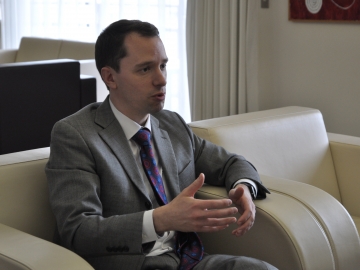 Lastly, Halldór advises students aspiring for an international public service position like his to jump at opportunities. “When the opportunity comes to work for your country in your adopted country, you grab it with both hands, especially if you have studied international relations or something that has to do with development, business or trade. I was lucky to be at the right place at the right time. What the job entails and how to represent yourself in another country can be quite scary, but if the chance comes along, absolutely go for it even if you are dead scared. The more it scares you, the better. Rather than saying you are not ready, take a plunge and then grow into the role. That has been my positive experience here at the Embassy. It can be very stressful, but for professional and personal growth, it is the best thing you can do.”
Lastly, Halldór advises students aspiring for an international public service position like his to jump at opportunities. “When the opportunity comes to work for your country in your adopted country, you grab it with both hands, especially if you have studied international relations or something that has to do with development, business or trade. I was lucky to be at the right place at the right time. What the job entails and how to represent yourself in another country can be quite scary, but if the chance comes along, absolutely go for it even if you are dead scared. The more it scares you, the better. Rather than saying you are not ready, take a plunge and then grow into the role. That has been my positive experience here at the Embassy. It can be very stressful, but for professional and personal growth, it is the best thing you can do.”
“Having a general sense of direction is important as well. Where do you see yourself in the next 5 or 10 years? It’s never too soon to start thinking. Start imagining yourself in a variety of positions because it will be easier for you to plan a strategy for self-improvement and life overall.”
The Graduate School of Asia-Pacific Studies
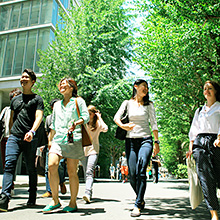 *The Graduate School of Asia-Pacific Studies (GSAPS) is one of the few educational institutions in the world that offers an interdisciplinary International Relations program which trains students in three specializations: Area Studies, International Relations and International Development/Policy Studies. As part of the vibrant and diverse GSAPS community, students are able to experience a microcosm of the global society as they pursue a range of curricular and research activities. Learn more about what other GSAPS alumni are doing here.
*The Graduate School of Asia-Pacific Studies (GSAPS) is one of the few educational institutions in the world that offers an interdisciplinary International Relations program which trains students in three specializations: Area Studies, International Relations and International Development/Policy Studies. As part of the vibrant and diverse GSAPS community, students are able to experience a microcosm of the global society as they pursue a range of curricular and research activities. Learn more about what other GSAPS alumni are doing here.













